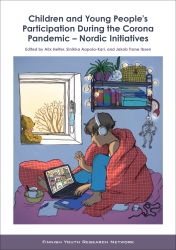Children and Young People’s Participation During the Corona Pandemic – Nordic Initiatives
Avainsanat:
Young people, Children, Participation, Well-being, nuoret, lapset, COVID-19, pandemiat, osallistuminen, koulunkäynti, vapaa-ajantoiminnat, rajoitukset, yhteiskunnalliset vaikutukset, lasten oikeudet, strategiat, toimenpiteet, osallisuus, tutkimus, PohjoismaatTiivistelmä
Several necessary restrictions and measures were implemented across the Nordic region to protect the population during the COVID-19 pandemic. Many children and young people have suffered because of these restrictions. In most Nordic countries, schools and cultural and recreational activities have been entirely or partially closed for long periods, and many services related to healthcare and welfare have become less accessible. These activities and services are important for children and young people’s quality of life. In some areas, however, the restrictions may have also made everyday life simpler for some. The experiences of the first few lockdowns seem to differ from those that came later. There are differences between children and youth based on their age, gender, ethnicity, and their socioeconomic status.
This report explores the situation of children and young people during the pandemic and their place within different Nordic countries’ governmental strategies, both at the central and regional levels. The purpose is to gain new comprehensive knowledge on what strategies and measures the Nordic countries implemented during the pandemic to ensure children and young people’s participation and influence in school and leisure time, consistent with the UN Convention on the Rights of the Child (Article 12). Another report will follow by the same research team on the current research being conducted concerning the participation in education and leisure of children and young people during the COVID-19 pandemic (Helfer et al., forthcoming 2023). Both reports focus on school-aged children and young people up to 25 years of age.
The primary research question was: What measures and strategies for ensuring the participation and influence of children and young people have been used in the different Nordic countries during the recent pandemic? Several interviews were conducted to answer the research question, supported by collecting material, including official statements, online. The aim was to investigate the decision-making process during the pandemic to see whether children and young people were consulted and involved when the authorities implemented strategies and measures in connection with the pandemic. Particular attention was paid to whether any assessment of children’s rights had been carried out by the authorities and at what stage. Close consideration was also given to whether institutions representing children and young people’s interests and rights in school and leisure were consulted and whether children and young people were directly involved in these discussions. The research timeframe was from the start of the pandemic in March 2020 until late spring 2022.
This report explores the relevant national authorities’ measures and strategies concerning education and leisure during the COVID-19 pandemic in Nordic countries, including Greenland, the Faroe Islands, and Iceland. In almost all countries, children’s voices were ignored to some degree or another in decision-making processes. In many cases, children and youth were consulted, but only after decisions were made. To some extent, the institutions working for and with children and youth were unprepared for the crisis. The lessons learned for ensuring that the best interests of the child are highlighted at the end of the report, together with other issues arising from the research questions. Clearly documenting the challenges encountered and other hindrances can help to identify and address these problems more effectively in the future.
The Finnish Youth Research Society and VIVE, the Danish centre for Social Science Research compiled these reports. This report was commissioned by The Nordic Welfare Centre and financed by The Nordic Committee on Children and Young People (NORDBUK), and The Nordic Council of Ministers. The report is part of a four-year project that aims to increase knowledge and cooperation in the Nordic region concerning Children and Young People’s Opportunities for Participation and Development During the COVID-19 Pandemic. The project falls under the Nordic Council of Ministers’ Action Plan for 2021–2024. The goal is for the Nordic region to become the world’s most sustainable and integrated region. A central objective of this goal is to ensure equal opportunities for the development and participation of all children and youth in the region.



